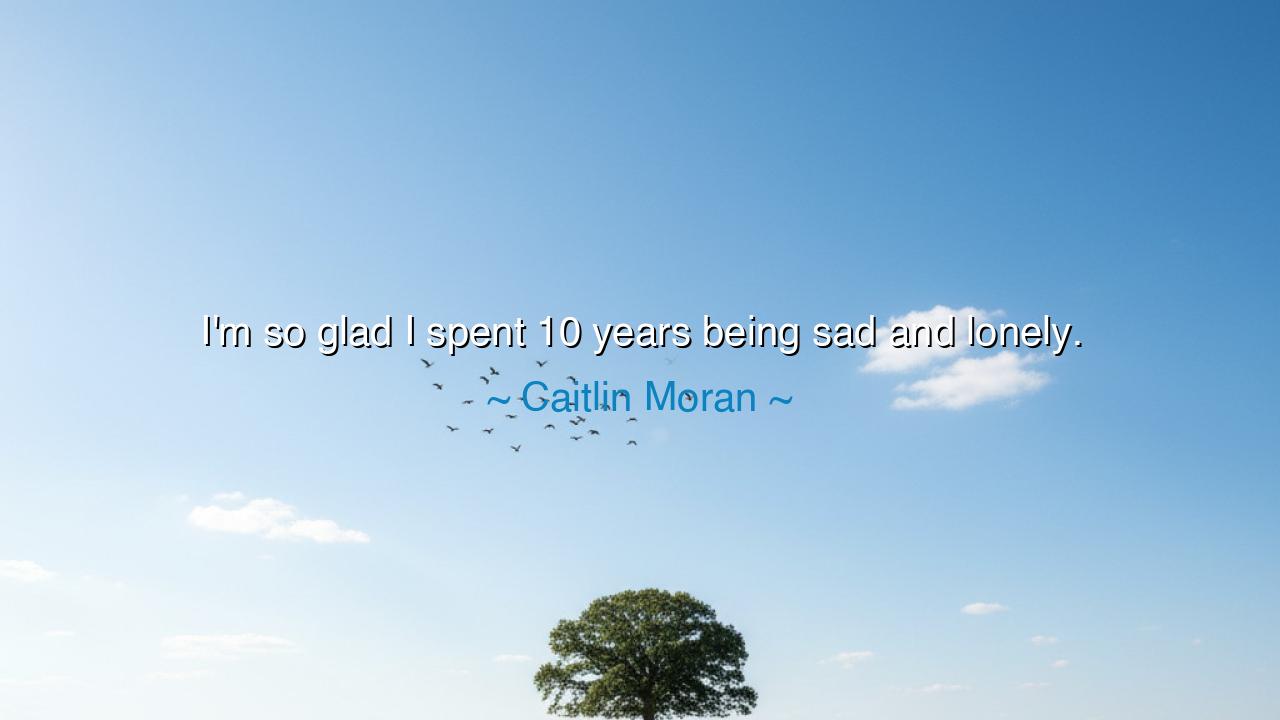
I'm so glad I spent 10 years being sad and lonely.






Hear the words of Caitlin Moran, sharp yet paradoxical, filled with both sorrow and triumph: “I’m so glad I spent 10 years being sad and lonely.” At first these words sound strange, for who would rejoice in grief, who would be thankful for emptiness? And yet, hidden within them is a truth known by the wise of every age: that suffering, though bitter, can become the seed of strength, that loneliness, though heavy, can teach the soul to stand, and that the years of darkness may prepare the heart for its greatest light.
The ancients themselves spoke often of this paradox. The Stoics taught that adversity is not an enemy but a teacher. Seneca declared that no man is strong who has not wrestled with hardship. Moran’s confession echoes this: she is glad for the years of sadness, not because they were pleasant, but because they forged her. Loneliness stripped away illusions, sorrow deepened her spirit, and in the furnace of those ten years she discovered her own resilience. The gift was not in the pain itself, but in what the pain revealed.
History bears witness to this same truth. Consider Abraham Lincoln, who in his younger days endured long bouts of what he called his “melancholy.” He lost friends, he lost love, and often he walked under the weight of despair. Yet it was this very loneliness that made him reflective, this sadness that deepened his compassion. When he became president during America’s darkest hour, he drew upon the wisdom he had gained in sorrow. His strength was born in his grief, and like Moran, he might have looked back and said he was glad for those years of suffering, for they prepared him for destiny.
There is also in Moran’s words a challenge to the shallow life. Many seek only constant comfort, avoiding pain at all costs. But those who never taste loneliness never learn the strength of self-reliance; those who never endure sadness never discover the depths of their own soul. Hardship, endured with courage, is not wasted—it becomes the foundation of wisdom. To be thankful for sorrow is to recognize that even suffering has purpose.
And yet, there is more. Her joy is not only that she endured, but that she emerged. Ten years is no small span; it is a decade of shadows. But having passed through it, she can now see that the years were not empty, but formative. The gladness she speaks of is the gladness of survival, of looking back at the pit and knowing it did not destroy her. To remember one’s weakness and yet stand strong is itself a triumph greater than ease could ever give.
The lesson, then, is this: do not despise the seasons of sorrow in your own life. If you walk through loneliness, know that it may be teaching you strength. If you sit in sadness, know that it may be deepening your compassion. Do not curse the years of hardship, for one day you may look back and, like Moran, be glad—glad not that you suffered, but that suffering shaped you into one who can endure, who can see, who can give.
Practical action follows: when hardship comes, do not flee it with bitterness or denial. Face it. Write, reflect, learn, and grow within it. Seek meaning, not escape. Remember stories of those who endured long nights before the dawn. And when your dawn comes, use the wisdom you gained to guide others who are still in the dark. For the pain you carried will not only have transformed you—it will become light for those who come after.
Thus Moran’s strange and paradoxical confession becomes eternal wisdom: that we may one day give thanks for the years of sadness and loneliness, for they are not wasted. They are the years that carved the soul into something stronger, deeper, and more radiant. What seems like a curse becomes, in hindsight, a blessing, and what seemed like despair becomes the very soil from which joy arises.






AAdministratorAdministrator
Welcome, honored guests. Please leave a comment, we will respond soon